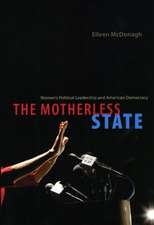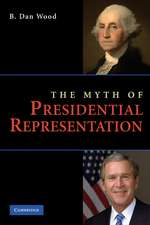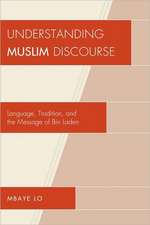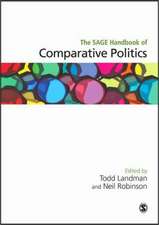Compulsion in Religion: Saddam Hussein, Islam, and the Roots of Insurgencies in Iraq
Autor Samuel Helfonten Limba Engleză Paperback – 12 oct 2021
| Toate formatele și edițiile | Preț | Express |
|---|---|---|
| Paperback (1) | 164.94 lei 10-16 zile | |
| Oxford University Press – 12 oct 2021 | 164.94 lei 10-16 zile | |
| Hardback (1) | 283.19 lei 31-37 zile | |
| Oxford University Press – 17 mai 2018 | 283.19 lei 31-37 zile |
Preț: 164.94 lei
Preț vechi: 178.06 lei
-7% Nou
Puncte Express: 247
Preț estimativ în valută:
31.56€ • 33.04$ • 26.27£
31.56€ • 33.04$ • 26.27£
Carte disponibilă
Livrare economică 26 februarie-04 martie
Preluare comenzi: 021 569.72.76
Specificații
ISBN-13: 9780197601266
ISBN-10: 019760126X
Pagini: 304
Dimensiuni: 234 x 155 x 20 mm
Greutate: 0.45 kg
Editura: Oxford University Press
Colecția OUP USA
Locul publicării:New York, United States
ISBN-10: 019760126X
Pagini: 304
Dimensiuni: 234 x 155 x 20 mm
Greutate: 0.45 kg
Editura: Oxford University Press
Colecția OUP USA
Locul publicării:New York, United States
Recenzii
Samuel Helfont has convincingly clarified a number of key factors that eluded most Americans two decades ago. That alone makes Compulsion in Religion essential reading for anyone wishing to understand recent Iraqi and American history
Helfont gives us a compelling picture of religious life under Saddam. This book can serve as an invaluable resource for anyone who wants to understand Iraq and its sectarian conflicts better. The Western media and politicians love to paint Iraq in single colors, focusing on corruption or the constant violence. Helfont gives us a nuanced and rich view of the Iraqi religious landscape.
Compulsion in Religion is the definitive account of the religious policies of Saddam's regime and mosque-state relations in Ba'thist Iraq. It will be of interest to scholars of Iraq, religion, comparative politics, and general readers searching for an antidote to inaccurate information on the subject.
This work is indispensable for scholars of religion and authoritarianism as a hypothesis-generating case study and is a welcome contribution to the field of religion and politics in particular.
[S]cholars have been hard at work refining and challenging conventional narratives regarding Ba'thist Iraq. ... Compulsion in Religion forms a significant contribution to this more general effort. â [It] will be of great interest to students of Iraqi history and modern Iraqi politics alike.
[A] fascinating new book.
Samuel Helfont has provided us with groundbreaking insights into the way Saddam Hussein's Ba'th Party used Islam to control the Iraqi population during his dictatorship-and how the abrupt removal of that control influenced the insurgencies that erupted in the wake of the American invasion in 2003. Most importantly, this book illuminates why those insurgencies were so virulent, and how the wake of Saddam Hussein's use of Islamic institutions to control the Iraqi population will continue to ignite conflict in the Middle East for generations to come."
Samuel Helfont tackles an important subject that is significant not only for its historical aspects but also for its relevance to current affairs given the rise of Islamic fundamentalism and ISIL. He has tapped the Iraqi archives, providing a real contribution to the literature on Iraq's history and issues related to current politics."
Compulsion In Religion is one of a series of recent books to use the Baathist documents to shed new light on the former regime. Helfont provides a totally original look at how Saddam observed, co-opted, repressed, and then operationalized religion to secure his rule and use it as another means to control society. He counters much of the previous research that largely dismissed religion in Iraq under the Baath. The book could also lead to a whole new range of research into how the insurgency and militias emerged in post-2003 Iraq. It's therefore essential reading for Iraq researchers." - Musings on Iraq
Helfont gives us a compelling picture of religious life under Saddam. This book can serve as an invaluable resource for anyone who wants to understand Iraq and its sectarian conflicts better. The Western media and politicians love to paint Iraq in single colors, focusing on corruption or the constant violence. Helfont gives us a nuanced and rich view of the Iraqi religious landscape.
Compulsion in Religion is the definitive account of the religious policies of Saddam's regime and mosque-state relations in Ba'thist Iraq. It will be of interest to scholars of Iraq, religion, comparative politics, and general readers searching for an antidote to inaccurate information on the subject.
This work is indispensable for scholars of religion and authoritarianism as a hypothesis-generating case study and is a welcome contribution to the field of religion and politics in particular.
[S]cholars have been hard at work refining and challenging conventional narratives regarding Ba'thist Iraq. ... Compulsion in Religion forms a significant contribution to this more general effort. â [It] will be of great interest to students of Iraqi history and modern Iraqi politics alike.
[A] fascinating new book.
Samuel Helfont has provided us with groundbreaking insights into the way Saddam Hussein's Ba'th Party used Islam to control the Iraqi population during his dictatorship-and how the abrupt removal of that control influenced the insurgencies that erupted in the wake of the American invasion in 2003. Most importantly, this book illuminates why those insurgencies were so virulent, and how the wake of Saddam Hussein's use of Islamic institutions to control the Iraqi population will continue to ignite conflict in the Middle East for generations to come."
Samuel Helfont tackles an important subject that is significant not only for its historical aspects but also for its relevance to current affairs given the rise of Islamic fundamentalism and ISIL. He has tapped the Iraqi archives, providing a real contribution to the literature on Iraq's history and issues related to current politics."
Compulsion In Religion is one of a series of recent books to use the Baathist documents to shed new light on the former regime. Helfont provides a totally original look at how Saddam observed, co-opted, repressed, and then operationalized religion to secure his rule and use it as another means to control society. He counters much of the previous research that largely dismissed religion in Iraq under the Baath. The book could also lead to a whole new range of research into how the insurgency and militias emerged in post-2003 Iraq. It's therefore essential reading for Iraq researchers." - Musings on Iraq
Notă biografică
Samuel Helfont is an Assistant Professor of Strategy and Policy in the Naval War College program at the Naval Postgraduate School in Monterey, California.


















